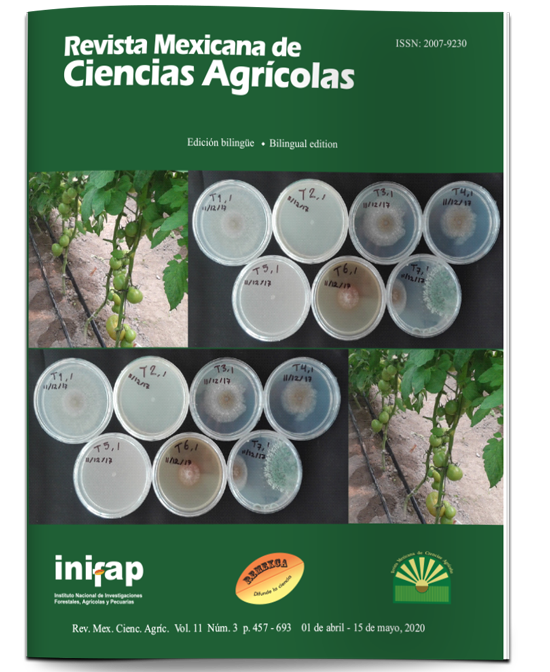Amaranth cystatin prevents and controls early blight in tomato
DOI:
https://doi.org/10.29312/remexca.v11i3.2066Keywords:
Alternaria sp., Solanum lycopersicum L., phytocystatinsAbstract
Early blight is a disease caused by Alternaria alternata in tomato and other vegetables. This fungus affects the leaves, stem bases and fruits, causing economic losses. Different fungicides are currently used to control fungal diseases; however, these increase production costs and pose a risk to health and the environment. Therefore, the use of biological products, including phytocystatins, represent an attractive alternative for the control of plant diseases. Phytocystatins are widely distributed proteins in plants, which inhibit the activity of cysteine-like proteases and affect the growth and development of some phytopathogenic fungi. Preliminary work showed in vitro tests that amaranth cystatin produced recombinantly in Escherichia coli, inhibited the growth and development of some phytopathogenic fungi, including Alternaria alternata. In the present work, the effect of foliar application of amaranth cystatin in the prevention and control of early blight in tomato plants was determined. Greenhouse tests carried out in the municipalities of Irapuato and Celaya, in the state of Guanajuato (Mexico), during 2018, show that the foliar application of amaranth cystatin (168 μg and 335 μg of cystatin/plant) prevents and controls the development of blight early in different tomato varieties in crops under commercial greenhouse production. These results show the potential of cystatin in the control of fungal diseases.
Downloads
Published
How to Cite
Issue
Section
License
The authors who publish in Revista Mexicana de Ciencias Agrícolas accept the following conditions:
In accordance with copyright laws, Revista Mexicana de Ciencias Agrícolas recognizes and respects the authors’ moral right and ownership of property rights which will be transferred to the journal for dissemination in open access. Invariably, all the authors have to sign a letter of transfer of property rights and of originality of the article to Instituto Nacional de Investigaciones Forestales, Agrícolas y Pecuarias (INIFAP) [National Institute of Forestry, Agricultural and Livestock Research]. The author(s) must pay a fee for the reception of articles before proceeding to editorial review.
All the texts published by Revista Mexicana de Ciencias Agrícolas —with no exception— are distributed under a Creative Commons License Attribution-NonCommercial 4.0 International (CC BY-NC 4.0), which allows third parties to use the publication as long as the work’s authorship and its first publication in this journal are mentioned.
The author(s) can enter into independent and additional contractual agreements for the nonexclusive distribution of the version of the article published in Revista Mexicana de Ciencias Agrícolas (for example include it into an institutional repository or publish it in a book) as long as it is clearly and explicitly indicated that the work was published for the first time in Revista Mexicana de Ciencias Agrícolas.
For all the above, the authors shall send the Letter-transfer of Property Rights for the first publication duly filled in and signed by the author(s). This form must be sent as a PDF file to: revista_atm@yahoo.com.mx; cienciasagricola@inifap.gob.mx; remexca2017@gmail.
This work is licensed under a Creative Commons Attribution-Noncommercial 4.0 International license.



